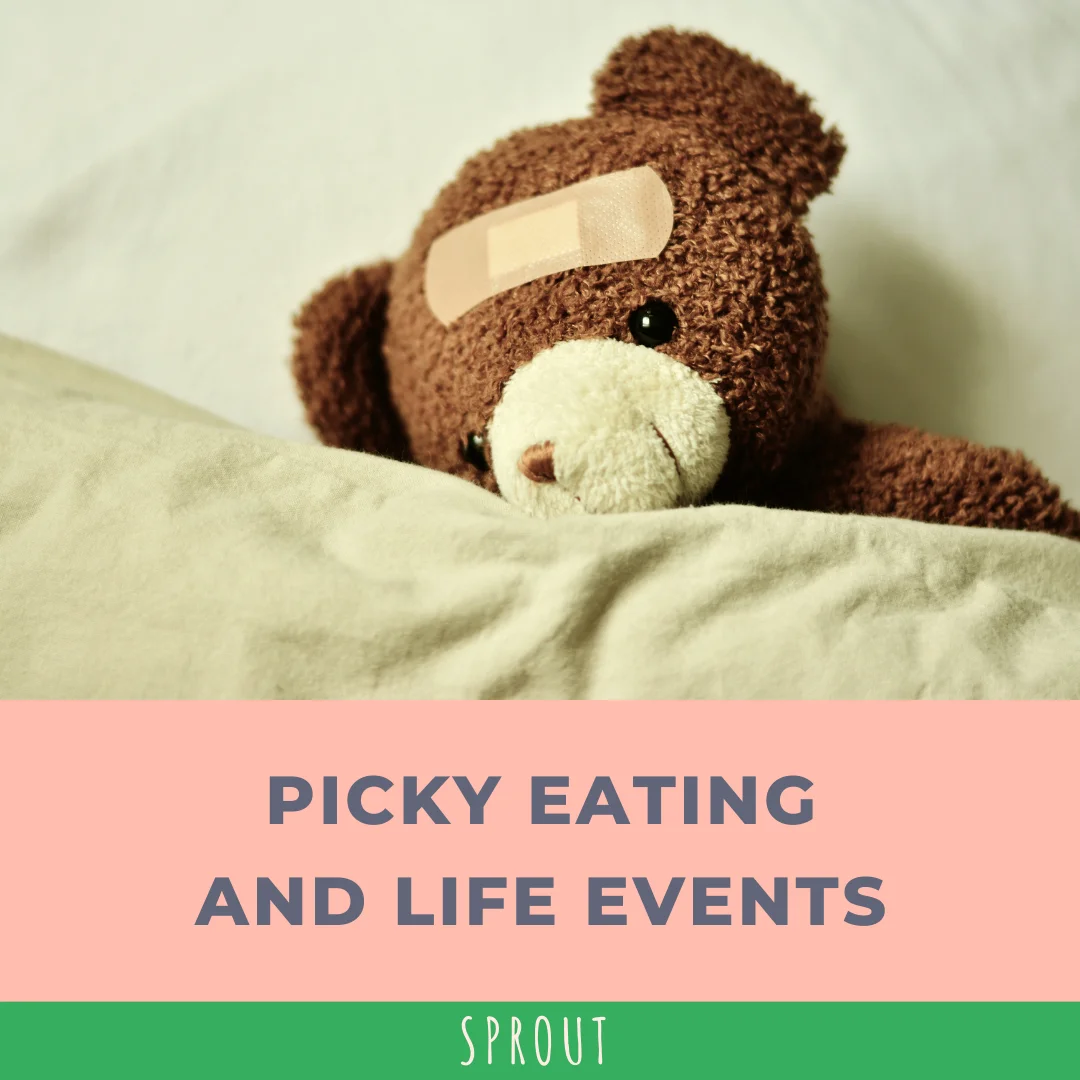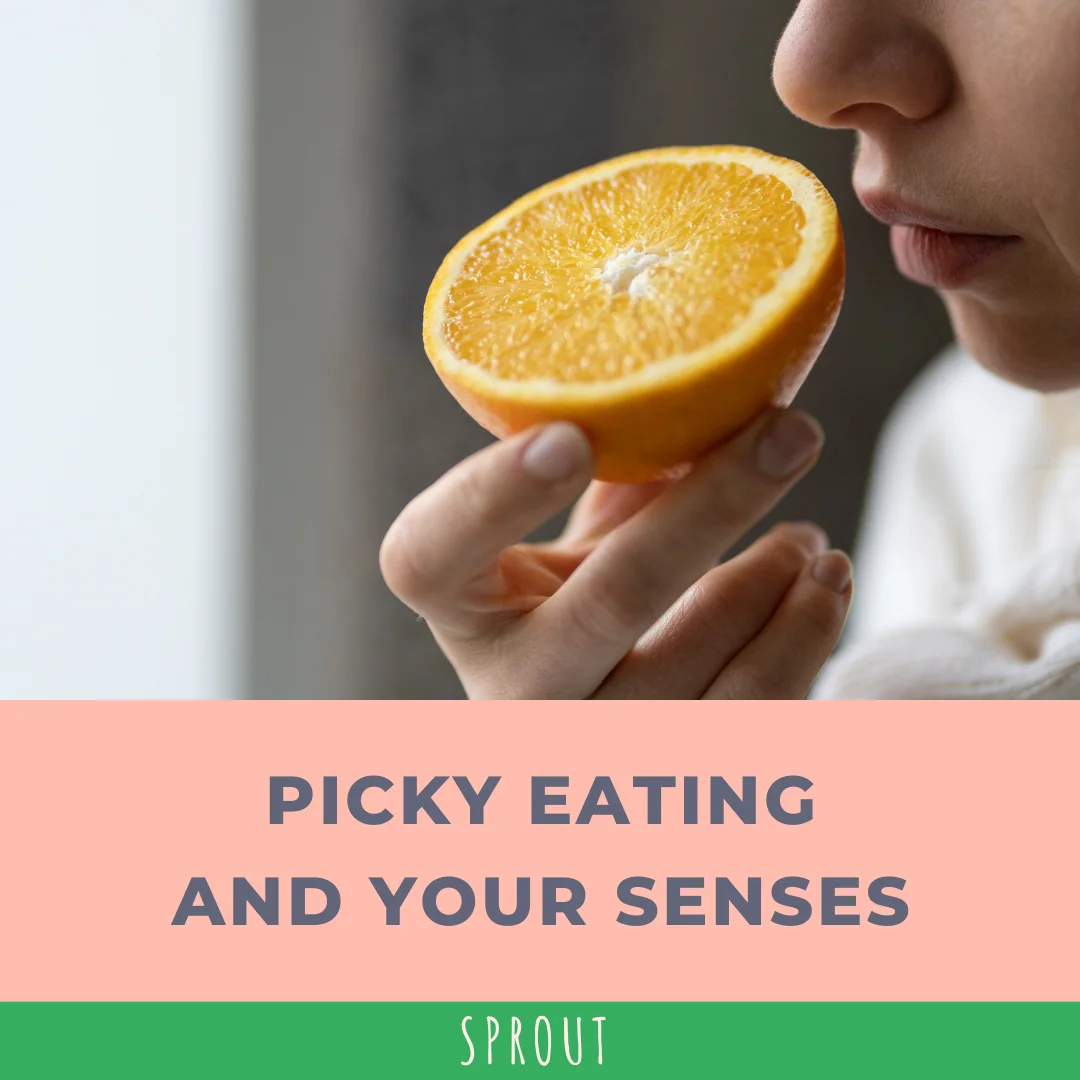We’re sure you know what we’re talking about here - when a child shows some interest and curiosity around food, and then it’s like they hit a brick wall when it comes to putting it in their mouth. Some kids will even say “That smells nice” or “I wish I could eat that” but the enthusiasm ends there, and eating it is a totally different story. Parents often say “it’s like they want to, they genuinely want to eat other foods - but they just can’t”. So, what’s going on here? And is this barrier to eating a wider variety psychological? Picky or avoidant eating happens for a whole host of reasons - and for most kids it doesn’t come down to just one. Most often it’s a combination of psychological, sensory, medical, and social reasons. In this article, we’ll pick apart some of the most common psychological factors that relate to picky eating and some ways you can start to make a difference!
Anxiety
The first thing to acknowledge is that lots of children feel genuine
anxiety about eating new foods. And just like one of us might wish we could
stand up on stage to deliver a comedy set to a theatre full of people, for
many of us, nerves get in the way and we’d think “that’s something I just
can’t do!”.
General anxiety about other things like school, friends, and new situations
can also play a part. When we feel worried about other things that might be
happening in the day - our appetite shuts down, our curiosity vanishes, and
it feels much more comfortable to stick to the familiar.
Temperament
Children are all born with a different set of traits - and who your child is as a person may partly shape how they interact with food. Some children are a little more cautious in nature and take a while to suss out a situation before feeling comfortable, whereas other kids are fearless and get stuck in right away.
You’ve all seen those kids who are quite content to toddle along with whatever is happening that day, compared to those who need to know the routine - and very clearly want to have their say! Then we have children who are relatively easy to soothe when they get upset, and others who feel emotions very deeply and can have very big reactions to things like fusilli being served instead of penne!
So, it makes sense that how your child interacts with food may be a reflection of their wider temperament - and those who are more avoidant eaters are often more cautious, feel emotions deeply, and may have a preference for predictable routines. Does this sound at all familiar to you!? Understand the factors at play for your child using our Picky Profile Tool - access on the Sprout homepage: https://eatwithsprout.com/
Emotion regulation
While we’re all born with different traits that make us human - regulating our emotions is a skill we can develop. Some children get upset or angry very suddenly without noticing the early warning signs, they may find it difficult to differentiate between different feelings (like worry, sadness, and anger), and it may take them a long time to calm down.
When children struggle with emotion regulation, this can sometimes make
eating and mealtimes challenging. This could happen in a variety of ways -
they may sometimes be too upset or angry to eat and they may have big
reactions in response to foods or food situations.
Also, when it’s the fifth emotional outburst that day - you’re much more
likely to give in and give them that cookie they’ve been asking for - more
crying is distressing for them, and it’s distressing for you! So, food can
easily become a tool for managing emotions - and in some cases this can
have a knock-on impact on appetite and variety at planned meal and snack
times.
Negative associations
Like all of us - children can develop negative associations with eating, or particular foods. This may stem from painful or uncomfortable experiences with food relating to a medical issue like reflux or constipation that may have been going on for some time. Or, a negative association may develop from a once-off event like a stomach bug.
Also, if mealtimes have been stressful in the past and there have been
battles over trying new foods - then your child may start to associate the
table or their high chair with stress and resist coming to the table for
meals. You’re not alone if this has happened! And the good news is that
there are changes you can make.
If the table has become an unenjoyable place to be - how about a fresh
start? See if you can change the position of your table in the room, get a
new table-cloth, mix up the seating arrangements and the lighting and
create a new space that’s positive, relaxed and battle-free.
Psychological needs
Just like there are physical things we need in order to survive like water, food, and shelter/warmth, there are psychological things we all need to be able to grow and thrive.
You can imagine these as imaginary cups that have to be full. When the cups are full we are thriving, and when one or more is running low, we’re struggling and we start to lose our motivation and drive! According to a well-known psychology theory called self-determination theory, the basic psychological needs are:
· Relatedness (connection and a feeling of warmth with others)
· Autonomy (feeling in control of our own body and actions)
· Competence (feeling able, capable, situations match our skill level)
Sometimes, when some of these needs are not being met - for instance if children are eating alone, there are arguments around food, they feel pressured to eat or finish their meal when they don’t want to, or the foods are much too challenging for their current ability - then it’s very hard to thrive with eating!
Feeding interactions
Of course, the psychology of eating isn’t all about how we relate to the food, but it’s about how we relate to others around food too. So, interactions between parents and children are part of the picture. Unfortunately - it’s a bit counter-intuitive! So many of the ways that parents naturally respond (it’s our instinct after-all!) can actually exacerbate picky eating. Lots of research studies have found that the more children feel “pressure”, or an expectation on their eating, it makes avoidant eating worse. So, unfortunately all of that encouragement, persuasion, reasoning, rewards, prompts, and games to try to get children to eat may not be helping! Why does pressure to eat make avoidant eating worse? Well, this ties in to some of the other points above - it may lead to negative associations with mealtimes, increased anxiety around food, and may lead a child to feel that they don’t have autonomy over what goes in their body.
What can you do?
So, knowing more about the psychological factors that relate to avoidant eating - what can you do to support your child’s relationship with food?
· Explore ways of supporting your child with anxiety away from, and before, mealtimes - e.g. breathing games, singing songs together, children’s yoga or mindfulness
· Accept that your child’s eating may partly be who they are - and it’s not something you’ve done wrong!
· Validate emotions, name feelings, and role-model coping strategies “oh, I’m starting to feel really agitated, I think I need to take a few deep breaths”
· Develop ways of responding to emotions without using food - e.g. cuddles, gentle rocking, fresh air, games
· Have a fresh start - with a new table set up for meals!
· Fill your child’s cup with positive connection away from & during meals
· Set a structured routine & menu, but give your child autonomy over what goes in their body in the moment - no more “you have to take 3 bites before you leave the table”.
· Make sure mealtimes are neither too easy or too challenging for your child - meet them where they are at right now so that they can feel successful!
So yes - even if picky eating relates to some physical or medical factors
like reflux, a strong gag reflex, or allergies, you can see how psychology
plays a part. It’s complex stuff - right? So, this is why at Sprout, we
believe that trying every trick under the sun to “get kids to eat” usually
backfires. Instead, let’s approach picky eating from a place of
understanding, compassion, meeting our children’s needs, and supporting
their emotion regulation skills. If you’d like more support with supporting
your child when it comes to the psychology of eating - why not check out
our three levels of support, Sprout Digital, Sprout Team, & Sprout
Personal: Help my picky eater
References:
Cormack, J., Rowell, K., & Postăvaru, G. I. (2020). Self-determination theory as a theoretical framework for a responsive approach to child feeding. Journal of nutrition education and behavior, 52(6), 646-651.
Daniels, L. A. (2019). Feeding practices and parenting: A pathway to child
health and family happiness. Annals of Nutrition and Metabolism, 74(2), 29-42.
Deci, E. L., & Ryan, R. M. (2012). Self-determination theory. Handbook of theories of social psychology , 1(20), 416-436.
Finnane, J. M., Jansen, E., Mallan, K. M., & Daniels, L. A. (2017).
Mealtime structure and responsive feeding practices are associated with
less food fussiness and more food enjoyment in children. Journal of nutrition education and behavior , 49(1), 11-18.
Galloway, A. T., Fiorito, L. M., Francis, L. A., & Birch, L. L. (2006).
‘Finish your soup’: counterproductive effects of pressuring children to eat
on intake and affect. Appetite, 46(3), 318-323.
Haycraft, E., Farrow, C., Meyer, C., Powell, F., & Blissett, J. (2011). Relationships between temperament and eating behaviours in young children. Appetite, 56(3), 689-692.
Maiz, E., & Balluerka, N. (2018). Trait anxiety and self-concept among children and adolescents with food neophobia. Food Research International , 105, 1054-1059.

